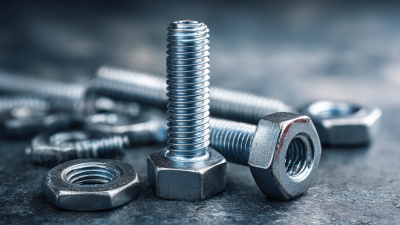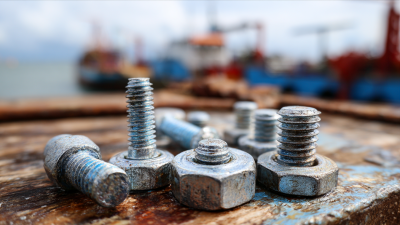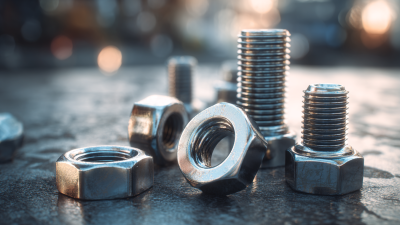Inquiry
Form loading...
When embarking on nautical projects, selecting the appropriate Marine Fasteners is crucial for ensuring the safety and longevity of your vessel. According to Market Research Future, the marine fasteners market is projected to witness significant growth, with an estimated CAGR of 5.2% from 2020 to 2026, driven by the rising demand for recreational boating and the increasing number of commercial maritime activities. The right marine fasteners not only contribute to structural integrity but also enhance performance in challenging marine environments. Understanding the material properties, corrosion resistance, and load capacities of various fasteners is essential for making informed choices.

In this blog, we will explore key considerations and best practices for selecting marine fasteners tailored to your specific nautical projects, ensuring both reliability and durability.
 When embarking on nautical projects, selecting the right marine fasteners is crucial for ensuring the longevity and safety of your vessel. Marine fasteners come in various types, including bolts, nuts, screws, and washers, specifically engineered to withstand harsh marine environments. According to industry reports, fasteners made from materials such as stainless steel, bronze, and nylon demonstrate superior corrosion resistance, vital for maintaining structural integrity in salty and humid conditions. In fact, a study highlighted that nearly 90% of all marine structure failures are attributed to the failure of fasteners, emphasizing the need for meticulous selection.
When embarking on nautical projects, selecting the right marine fasteners is crucial for ensuring the longevity and safety of your vessel. Marine fasteners come in various types, including bolts, nuts, screws, and washers, specifically engineered to withstand harsh marine environments. According to industry reports, fasteners made from materials such as stainless steel, bronze, and nylon demonstrate superior corrosion resistance, vital for maintaining structural integrity in salty and humid conditions. In fact, a study highlighted that nearly 90% of all marine structure failures are attributed to the failure of fasteners, emphasizing the need for meticulous selection.
Understanding the different categories of marine fasteners is essential for specific applications. For instance, self-tapping screws are ideal for decking and other exposed surfaces, providing reliable attachment without pre-drilling. On the other hand, anchor bolts are vital for securing heavy machinery and fixtures, ensuring stability against strong sea conditions. Additionally, as vessels increasingly focus on environmental compliance, adhering to regulations such as MARPOL Annex 4 regarding sewage disposal underscores the importance of choosing fasteners that not only support structural requirements but also align with sustainable practices in marine engineering.
When selecting marine fasteners for your nautical projects, it's essential to consider several key factors that can significantly impact the durability and performance of your installations.
First and foremost, the material of the fasteners should be chosen based on the environmental conditions they will face.
Stainless steel is often recommended for its resistance to corrosion, while materials like brass can also be suitable depending on the specific application.
Another crucial aspect is the type of fastener you need. Different marine settings may require particular fasteners, such as screws, bolts, or nuts, each tailored to specific tasks like holding components together under extreme conditions or providing flexibility.
It's important to evaluate the load and stress that these fasteners will endure to ensure you're choosing the right type.
Tips: Always assess the compatibility of your fasteners with the materials you are using. For instance, dissimilar metals can lead to galvanic corrosion, which may jeopardize your project's integrity.
Additionally, consider the installation process; some fasteners may require specialized tools or techniques, making your project more complex.
Ultimately, investing time in selecting the right marine fasteners can save you time and effort in the long run.

When it comes to marine projects, selecting the right fasteners isn't merely a matter of convenience; it's fundamentally about durability and reliability against challenging marine environments. The choice of materials used in fasteners can significantly influence their performance, particularly in terms of fatigue and corrosion resistance. Recent reports indicate that the U.S. Industrial Fasteners market is projected to grow substantially, underscoring the increasing recognition of fasteners' roles in crucial applications, including marine uses.
Material selection is paramount, especially when considering options like bimetal composite bolts that incorporate advanced manufacturing techniques such as hot rolling and thread rolling. For instance, studies on HR bimetal composite bolts made from 304 and Q235 materials reveal that variations in heat treatment and fabrication processes can enhance both fatigue and corrosion resistance. This means that for marine applications where exposure to saltwater and moisture is inevitable, opting for high-quality materials can lead to longer-lasting and more reliable constructions.
Moreover, specific applications, like deck fasteners, are often overlooked yet crucial for the integrity of marine structures. Whether it's screws, nuts, or bolts, selecting the right fasteners based on their material properties can make all the difference in ensuring a successful and durable project. The shift towards more specialized fasteners is a trend likely to influence the market significantly, making careful material selection more critical than ever for nautical endeavors.
| Material | Corrosion Resistance | Strength | Weight | Cost |
|---|---|---|---|---|
| Stainless Steel | Excellent | High | Moderate | Moderate |
| Aluminum | Good | Moderate | Lightweight | Low |
| Bronze | Excellent | High | Moderate | Moderate |
| Plastic | Good | Low | Lightweight | Very Low |
| Titanium | Excellent | Very High | Lightweight | High |
When it comes to sizing and installing marine fasteners, precision and adherence to best practices are crucial for optimal performance in nautical projects. The first step in the process is selecting the right size fasteners based on the materials you'll be working with and the specific loads they will incur. For instance, if you're securing a lightweight fiberglass deck, thinner bolts may suffice, while heavier applications, like structural reinforcements on a steel hull, will necessitate larger, more robust fasteners. Utilizing manufacturer guidelines and referring to industry standards can help you make informed choices regarding fastener dimensions.
Installation techniques are just as vital as sizing. It's essential to follow the correct torque specifications and sequence when tightening fasteners, especially in multi-bolt assemblies. Over-tightening can lead to deformation or failure of the materials, while under-tightening might result in looseness over time. Additionally, applying the right type of sealant or lubricant can enhance the durability and resistance to corrosion. Always ensure that fasteners are made from high-quality, corrosion-resistant materials such as stainless steel or bronze to withstand the harsh marine environment, ensuring your projects are both secure and long-lasting.
When embarking on nautical projects, choosing the right marine fasteners is crucial for ensuring the longevity and safety of your equipment. Renowned brands that specialize in marine hardware, such as SeaDog Line, Attwood, and Harken, offer a range of reliable products designed to withstand harsh marine environments. These companies are recognized for their commitment to quality and durability, making them go-to choices for boat builders and enthusiasts alike.
One important tip when selecting marine fasteners is to consider the material. Stainless steel, especially grade 316, is a popular choice for its corrosion resistance and strength. Additionally, nylon fasteners are great for applications where non-conductivity and light weight are priorities. Pay close attention to the specific needs of your project, as selecting the right material can significantly impact your project’s success.
Another tip is to check for compatibility with other materials used in your project. Some fasteners are designed to work seamlessly with particular hull materials or finishes, preventing issues like galvanic corrosion. Always ensure that the fasteners you choose match the specifications required for your marine application, ensuring both functionality and longevity.







